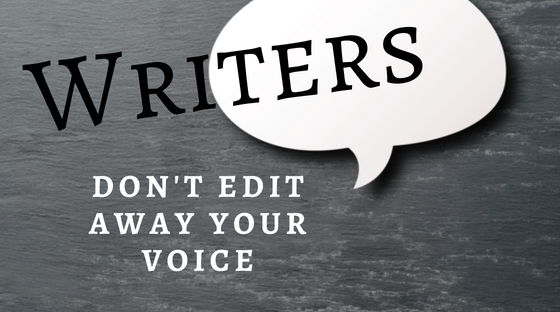Good morning wonderful writers, I hope you’ve all had a great week.
This week I finished another set of edits, which I think puts me on draft…7? 8? I’ve lost count! Since I finished my first draft almost a year ago, it has been not stop edits. It’s safe to say my story is a lot more well rounded and polished now.
Yet I’ve been thinking a lot recently about all the advice we writers are given in regards to how we tell our story; show not tell, don’t use this word, don’t use that word, don’t write like this or like that…and it’s difficult because we are also given the almost contrasting advice to break the rules, to be unique, to write the way we want too.
Editing, I’ve learnt, is about finding the balance to strengthen your writing, while staying true to your voice. Writer and blogger K.M.Allan has some great tips and checklists on her blog, to help you find words that are potentially weakening your prose. She also makes the very important point to only delete certain words if they don’t add anything to the sentence, and to keep them if they serve a purpose. This is the kind of advice we should follow!
Because otherwise, we run the risk of losing our voice. And your voice is your one chance to stand out, to be unique to you. So with that in mind, here are some tips on how not to edit away your voice.
1. Don’t remove words from character dialogue
This isn’t to say never edit your character’s dialogue, of course. But remember that words that don’t typically make an impact in prose or descriptions CAN sometimes have an impact on a character’s voice. Your characters shouldn’t all speak the same, and if one of them has a certain way of speaking, or certain words they use a lot, then don’t edit those. Part of having your own writing voice is ensuring your characters have a unique voice of their own.

2. Don’t delete the lines you are proud of
We all have those lines don’t we? Those sentences that make us think, yeah, they’ll quote that on instagram. Those lines that make you swell a little, pride breaking through the doubt. If you are completely happy with the structure of the sentence, even if it goes against “rules”, then keep it. These are your words, and this is your story to tell. Keep the writing you are most proud of, and you’re more likely to come to a finished piece that you can be passionate about.

3. Remember, everybody’s opinions are different
When you start sending your novel out to beta readers, it is easy to think you need to react to every comment they make, or every piece of feedback they give. This is a mistake. If you did this, you would be re-writing your novel for every beta. Don’t get me wrong; their feedback is important, essential even. Personally, having betas has improved my novel and I am so grateful for their support and advice. But everybody is different, and what one reader likes, another reader won’t. What’s important is you listen to the advice, but make the ultimate decision based on what YOU want. It’s your story, after all.

4. Consider point of view
Who’s telling the story, and from what perspective? This has a huge impact on the tone of the novel, and again means you may have to disregard some of the conventional rules to stay true to your voice. For example, parts of my story are told in the form of a letter, written from a young man to his sister. He does a lot of telling, rather than showing. This is because he is writing to her, so it is in a second person narrative. And to me, this character would tell his version of events not show them with clever descriptions and metaphors. And if I edited his voice to show more than tell, then it wouldn’t be him any more.

Do you every worry that you’ve edited so much you’re losing your voice?
It’s something that’s played on my mind a lot so I’d love to hear your thoughts.
Comment below or message me any time to discuss,
Until then,
Keep writing,
M
x
Be social! I’m on facebook, twitter and instagram.


In my early drafts, I was often overloading sentences, so to say. Combined with very long paragraphs, it was something I needed to edit the most. It sounded like someone suddenly wanted to tell everything in a short time – maybe a bit too much like me in reality, in the rare cases I actually have much to tell.
Then, part of me thinks that it’s hard to notice having some kind of personal voice. I am used to talking (and thus writing) in some way that feels natural to me and maybe without having someone to point it out, I might not even notice it?
LikeLiked by 2 people
Hi Tomas. I agree. I always felt like I hadn’t captured a “voice” but beta readers have confirmed that I do, and that it remains consistent. It surprised me, but I was so pleased! Now to ensure I don’t edit it away 😉
LikeLiked by 1 person
Great advise! I made my first blog post a few days ago and I got great feed back! Now I’m feeling a little stuck. I’m nervous I won’t be able to live up to those expectations. These tips are good reminders.
LikeLiked by 1 person
You’ll do great 🙂 just keep being you x
LikeLike
This is an interesting (and reassuring) perspective, particularly point 2 which, as you suggest, may go somewhat in the face of Faulkner’s much quoted and much loved advice (in books about how to write, e.g. Stephen King) that ‘You must kill all of your darlings.’ I have passages where I have deliberately wanted to saturate the description across all the senses, and know some find this overwritten.
Whilst in no remote or tiniest way suggesting I compare with the great writer, I take some comfort from Angela Carter (good documentary on her on the BBC last night), who said “…ok, I write overblown, purple, self-indulgent prose – so f*cking what?”
LikeLiked by 1 person
Great comment, thanks so much for sharing your thoughts! You’re exactly right, you should write the way you want to, and the way you feel most suits your story. ❤
LikeLike
Reblogged this on Chris The Story Reading Ape's Blog.
LikeLiked by 1 person
Thank you 😀
LikeLiked by 1 person
Great post, ML 😀
LikeLike
Great post. Thanks for sharing this advice which I needed as I start my 2nd round of edits.
LikeLiked by 1 person
Glad it has come at a good time. Good luck with the edits!
LikeLike
Thank you. Need all the luck I can get.
LikeLiked by 1 person
Reblogged this on adaratrosclair.
LikeLiked by 1 person
Thank you 🙂
LikeLiked by 1 person
You’re welcome. 🙂
LikeLiked by 1 person
The first tip is such a great one! I think it’s easy to try and edit our characters, but I think what authentically comes out of their mouth is something we should try to keep. I think the way you use filler words or weak words in dialogue shows a ton about the characters. Great post and great tips! 😊
LikeLiked by 1 person
Thanks so much Madeline 🙂 Thanks for reading and commenting x
LikeLiked by 1 person
Reblogged this on Writing for the Whole Darn Universe.
LikeLiked by 1 person
Thank you 🙂
LikeLiked by 1 person
I’ve always hated that “Kill your darlings” advice, at least when it’s said with the intent of “If you think it’s really good, you should delete it.” Another writing “rule” that does more harm than good. Regarding beta readers and critique partners, suggestions made by all or most of them are the ones to take seriously. Thanks for this post!
LikeLiked by 3 people
Thanks Audrey. You’re so right, I think all advice should be taken carefully…ironic, as I am someone who gives out advice, but I’m the first to suggest it is subjective ❤
LikeLiked by 1 person
Thanks for your refreshing take on editing. It takes so long to develop a unique ‘voice’, and over-editing only makes it harder!
LikeLiked by 2 people
Thanks Marie. You’re so right about over-editing!
LikeLiked by 1 person
Great post, M. And thanks so much for the shout-out 😊. I love your tip about leaving words in the dialogue. That’s something I’ve found to be true after going through what feels like my millionth draft. I might remove something because it weakens my sentence, but it’s perfect for the dialogue.
LikeLiked by 1 person
You’re welcome – those check lists have been a huge help to me and I know they will be for other writers too ❤
LikeLike
😊
LikeLike
I absolutely love these points, especially #4. Since I switch points of view between two main characters in my current novel, I’m always careful to stay true to each characters’ perceptions of the world. One of them would notice the world in more literary, metaphorical ways, while the other has a more blunt and literal way of seeing the world. Great post!
LikeLiked by 1 person
That’s such a great example to validate point 4 ❤ Thanks for reading!
LikeLiked by 1 person
I particularly agree with #1.
I think it’s easy to focus on crafting the best, most eloquent writing, when it may be fitting for the character to speak in a rudimentary manner, or use incorrect grammar.
LikeLiked by 1 person
So true, Adam!
LikeLiked by 1 person
Reblogged this on Valerie Ormond's Thoughts On… and commented:
Loved this advice.
LikeLiked by 1 person
Thank you 🙂
LikeLike
Reblogged this on Author Don Massenzio and commented:
This post from the Uninspired Writers blog implores Writers: Don’t Edit Away Your Voice
LikeLiked by 1 person
Thank you 🙂
LikeLiked by 1 person
You’re welcome.
LikeLike
Reblogged this on Anna Dobritt — Author.
LikeLiked by 1 person
Thank you 😀 x
LikeLike
Every time I tell my (English Undergrad/Librarian Masters) mother that I’m doing another round of edits, she IMMEDIATELY assumes I’m editing away my voice. Luckily, my ego has stood fast and, as far as I can tell, I love every draft more.
I’ve done round of edits that don’t sound like me. But then I go back through, adjust, and my voice shines through.
LikeLiked by 1 person
Sounds like you’ve got the balance right 😀 It’s definitely (for me, at least) about learning to be confident enough in your voice to ignore some of the conventional “rules” and stay true to your story. xx
LikeLiked by 1 person
All excellent points and after having the pleasure of reading your WIP, I completely agree with you about keeping your letters as telling over showing. It’s in your characters voice. And they can say whatever they want, providing its authentic to them.
LikeLike
Thanks for the great reminders! I go through periods where I hate every word I write, and I try not to edit TOO much then lol- it can get brutal. Finding balance is oh so tricky.
LikeLiked by 1 person
Love your perspective. I’m a columnist whose first book was a collection of my columns. When I wanted to write a book in my dog’s voice, after getting encouragement from those who read the dog’s blog posts, I thought, “Oh, gee, I’m trying to write fiction now; I need to take a class on creative writing.” After I reworked my original blogs to beef up setting, add dialogue, and to follow the “show not tell” advice, my classmates told me I had lost my voice and they liked my original work better! I returned to my original style and published the first book.
As I began writing the dog’s second book, I got hung up on the guidelines that said I needed to have a conflict and a resolution. My publisher reminded me I was a journalist at heart and that my readers expected to read the same short, humorous anecdotes my dog shares in his blogs. That’s all I needed to continue in my original style and voice.
Thanks for the encouragement.
LikeLiked by 1 person
Hi Kathy, thanks so much for sharing your experience with us! It’s fascinating to hear how traditional advice wasn’t what worked best for your voice and style, and this is why writing is so brilliant. Because you don’t have to follow the rules, and breaking them helps make you unique. Thanks for stopping by and commenting ❤
LikeLike
Great tips. I think I needed to hear them.
LikeLiked by 1 person
Thank you, Khan! Glad they helped 😀
LikeLike
Reblogged this on Kim's Musings.
LikeLike